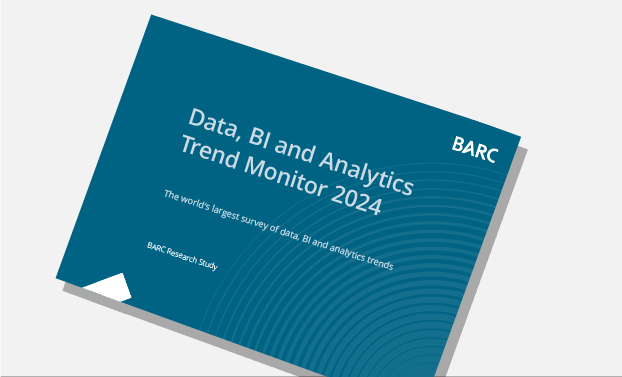The Real Business Intelligence Trends in 2024
Every business is a data business. And any data business needs to use analytics to support decision-makers to take action. Deriving value from data has become an imperative for many businesses to stay competitive – more and more business strategies call for the increased use of data across their organizations.
But becoming data-driven is not that easy. This survey on the importance of trends shows above all that users of data and analytics do not consider the latest technical innovations or media-dominated topics such as AI to be the most important. Greater importance is attached to the fundamental aspects of the data basis: security and quality as well as the governance that ensures these two aspects in particular. On the other hand, there is a focus on people: the aim is to develop a data-driven culture and increase data literacy.
The BARC Data, BI and Analytics Trend Monitor 2024 illustrates which trends are currently regarded as important in addressing these challenges by a broad group of BI and analytics professionals. Their responses provide a comprehensive picture of regional, company and industry-specific differences and offer insights into developments in the BI market and the future of BI.
Our long-term comparisons also show how trends have developed, making it possible to separate hype from stable trends. BARC’s Data, BI and Analytics Trend Monitor 2024 reflects on the business intelligence, analytics and data management trends currently driving the market from a user perspective.
Importance of Data, BI and Analytics Trends in 2024 (n=2,398)
The Most (and Least) Important Business Intelligence Trends in 2024
We asked 2,398 users, consultants and vendors for their views on the most important BI, analytics and data management trends, delivering an up-to-date perspective on regional, company and industry-specific differences and providing comprehensive insights on the BI, analytics and data management market.
Data security/privacy, data quality management and data governance are the three topics that practitioners identified as the most important trends in their work.
At the other end of the spectrum, dataOps, data lakehouse and data mesh were voted as the least important of the twenty trends covered in BARC’s survey.
The newly surveyed topic of data security jumps straight to number one this year. After six years at the forefront, data quality management has been caught up and is now ranked as the second most important trend, while the third most important trend, data governance, has steadily increased in importance. Having held down fourth position for several years, it rose to number three two years ago.
The significance of these three topics transcends individual regions and industry sectors. Establishing a data-driven culture is a trend that was newly introduced to the BARC Trend Monitor five years ago. Starting from fifth position in the first edition, it made its way up to number four. Self-service analytics (ranked five) has been an equally consistent trend.
Importance of Business Intelligence Trends (Timeline)
Our View on the Results
Data security in first position is a newly-introduced trend this year, while data quality management has been among the top trends for the last nine years. The significance of these two topics transcends individual regions and industry sectors. Data-driven culture is a trend that was first featured five years ago and has made the top five ever since. Similarly, data governance has consistently been among the top four in recent years, gaining in importance over the last five
years and now ranking third. Data literacy is also featured for the first time this year, occupying fifth position.
These top five trends represent the foundation for organizations to manage their own data and make good use of it. Furthermore, they demonstrate that organizations are aware of the relevance of secure and high-quality data. Organizations want to go beyond the collection of as much data as possible and actively use data to improve their business decisions – not only in management but across the organization as a whole. This necessitates broad data literacy throughout the enterprise.
However, there are some minor shifts in the downward trends. Cloud for data and analytics has fallen three places to twelve. Data quality management, the survey leader in recent years, is ranked number two this year. For real-time analytics (13th) and embedded analytics (16th), a continuous downward trend can be observed over the years. Our survey represents a broad mix of trends and shows that there is steady movement in the market. Trends that have been around for a long time occasionally make room for new ones, often because they become mainstream and do ot arouse much curiosity any more.
In the next few weeks and months, we will post and update a series of articles looking at each trend in more detail. You will learn how different regions, industries, user types, company sizes and best-in-class companies rate the various trends and how their views have changed since last year. Sign up for our newsletter below and we’ll keep you informed about the latest articles.
BARC Data, BI and Analytics Trend Monitor 2024
The full study features analyst commentary and user ratings of 20 trends in the BI and analytics market
Request the free report nowRecent Articles
Is Data Mesh a Sustainable Approach to Data Responsibility in the Business?
This BARC report discusses whether data mesh is a sustainable approach to data responsibility in the business, based on a survey of 345 companies worldwide.
ESG Challenges, Tools and Outlook
"The State of ESG & Sustainability Reporting – Challenges, Tools & Outlook" addresses ESG reporting, how leading organizations approach it, their motivation for doing it, and the tools that they use.
Modeling, Modernization and Automation
"Data Warehouse and Data Vault Adoption Trends" examines data warehouse and data vault adoption trends in modern analytics environments, including architecture types, priorities, and automation.



